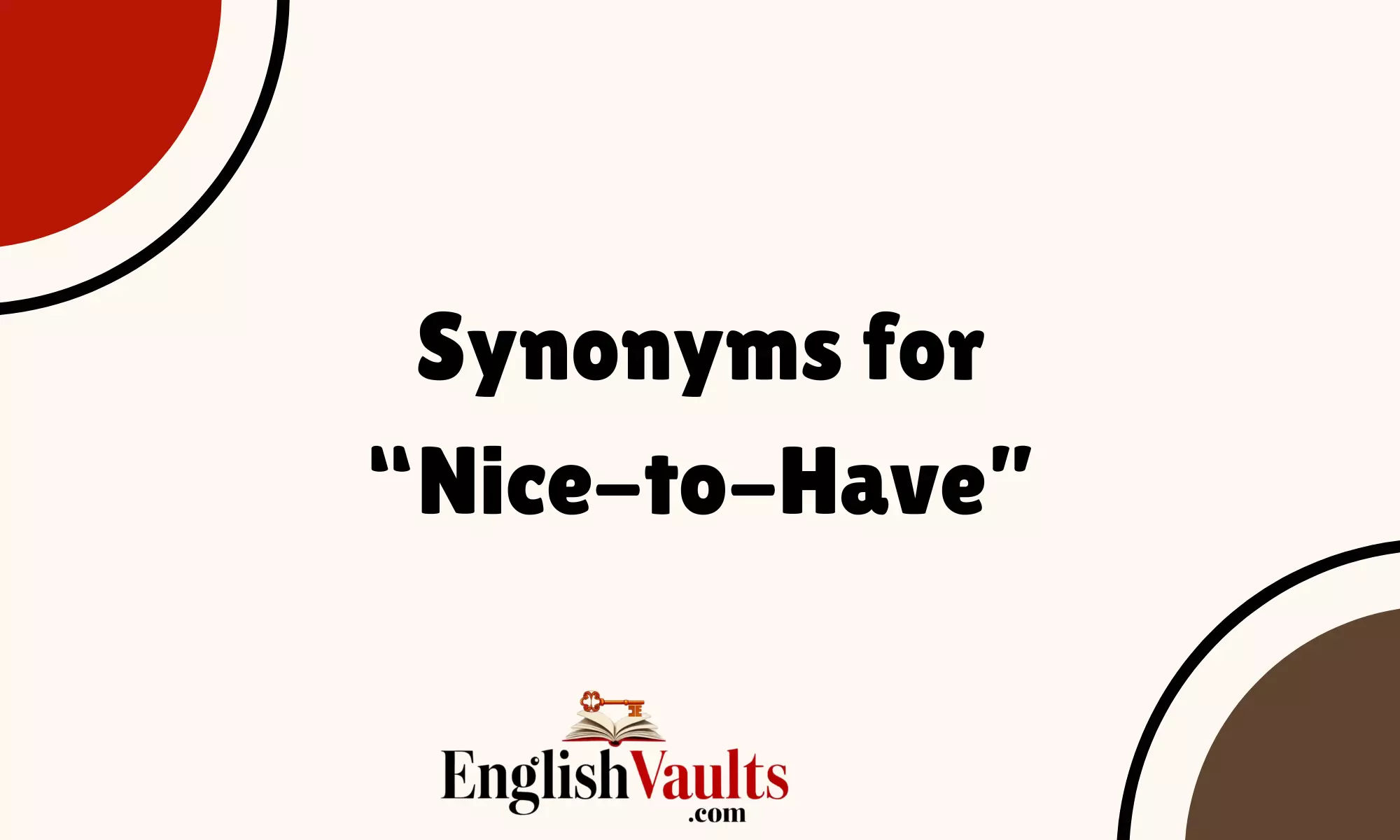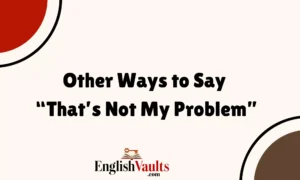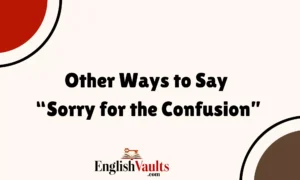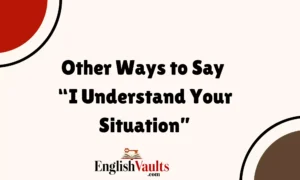In both professional and casual contexts, “nice-to-have” is a phrase commonly used to refer to something that isn’t necessary but would be beneficial or pleasant to have. Whether in business emails, conversations, or presentations, having a variety of ways to express this sentiment can enrich communication.
Below are 22 synonyms for “nice-to-have”, along with practical examples and additional insights for each.
Top List Of Synonyms for “Nice-to-Have”
1. What’s the Reason for Your Question?
2. Is There Something Specific You’re Trying to Learn?
3. Can I Ask Why You’re Interested?
4. What Made You Ask That?
5. Is There Something on Your Mind?
6. Are You Trying to Gather Information for Something?
7. What Are You Hoping to Find Out?
8. Why Does It Matter to You?
9. Is There a Particular Reason You’re Asking?
10. Are You Looking for Advice?
11. What’s Your Curiosity About?
12. Are You Trying to Find Something Out?
13. What’s Behind the Question?
14. What Are You Looking to Achieve?
15. Why Is That Important to You?
16. Is There Something You’re Hoping to Learn?
17. What Do You Plan to Do with That Information?
18. Why Do You Want to Know?
19. Are You After Something Specific?
20. What’s Your Goal with This Question?
21. What’s the Purpose of Asking?
22. What Do You Intend to Do with That Info?
23. What Do You Need to Know?
24. What’s the Story Behind That Question?
25. Why Does It Concern You?
1. Desirable
The term “desirable” implies that something is wanted or sought after but is not necessarily a requirement.
Example Email:
Subject: Updated Features for Upcoming Project
Hi Leo,
I wanted to share some updated features we’re considering for the upcoming project. These elements are desirable but not essential to the project’s success.
Feel free to let me know what you think!
Best regards, Henry
Additional Note: “Desirable” is a great way to express something that adds value but is not a dealbreaker if left out.
2. Bonus
When something is a “bonus,” it refers to an additional benefit that adds value but isn’t fundamental.
Example Email:
Subject: New Additions to the Marketing Plan
Hey Leo,
I’ve attached the new marketing plan for your review. We’ve also added a bonus feature—a special promotion that could further attract customers, though it’s not critical for the launch.
Looking forward to hearing your thoughts.
Best, Henry
Additional Note: This term works well when you want to convey something extra that’s optional but still a positive addition.
3. Add-on
An “add-on” is something supplementary that enhances the main offering but is not required.
Example Email:
Subject: Product Feature Suggestions
Hi Leo,
I’ve compiled a list of add-ons for the product. These are not necessary to the core functionality but could improve the user experience if implemented.
Let me know if you’d like to discuss any of them further.
Best regards, Henry
Additional Note: This is a common term in sales and marketing, especially when talking about optional features or upgrades.
4. Good-to-Have
“Good-to-have” is a term that’s nearly identical to “nice-to-have,” used to indicate something that’s not critical but desirable.
Example Email:
Subject: Product Update Ideas
Hi Leo,
We’ve been thinking about some good-to-have improvements for the app. These wouldn’t change the core functionality but could certainly enhance the overall experience for users.
Let me know your thoughts when you have a moment.
Best, Henry
Additional Note: It is often used when talking about incremental improvements that aren’t essential.
5. Non-Essential
This term refers to something that’s not necessary but could be useful.
Example Email:
Subject: Additional Features for the App
Hey Leo,
There are a few non-essential features we could add to the app in the next update. These wouldn’t affect the app’s core functions, but they might make the experience smoother for users.
What do you think about these suggestions?
Best regards, Henry
Additional Note: It’s a great term to use when discussing things that could be omitted without any major consequence.
6. Luxurious
“Luxurious” is often used for something extra that feels indulgent and above the basic needs.
Example Email:
Subject: Upgraded Design Suggestions
Hi Leo,
I was thinking about the design upgrades. Adding some luxurious details could improve the aesthetics significantly, although the core design will still stand strong without them.
Would love to hear your thoughts.
Best, Henry
Additional Note: While this word emphasizes indulgence, it’s often used in product design or customer-facing contexts.
7. Optional
“Optional” clearly means that something is not compulsory but may still be chosen if desired.
Example Email:
Subject: Project Updates
Hi Leo,
The new collaboration tool is optional for team members, but it could improve our efficiency if adopted. Feel free to explore it when you have time!
Best regards, Henry
Additional Note: This word is very direct and useful in situations where you want to make it clear that the feature or item is up to the individual’s choice.
8. Supplementary
“Supplementary” refers to something that adds extra value but isn’t part of the core requirements.
Example Email:
Subject: Project Enhancement Ideas
Hey Leo,
I’ve been considering some supplementary features we could add to the website. They aren’t required but could certainly complement the user experience.
Let me know your thoughts when possible.
Best, Henry
Additional Note: It’s commonly used when referring to elements that enhance or complement the core offering but aren’t mandatory.
9. Extra
“Extra” is a straightforward way to describe something additional that’s not necessary but would be a welcome addition.
Example Email:
Subject: Product Features and Updates
Hi Leo,
We’ve decided to add a few extra features to the app. These are not crucial to its function but could certainly make it more enjoyable for users.
Looking forward to your feedback!
Best regards, Henry
Additional Note: This is a very casual way of suggesting something non-essential but beneficial.
10. Gravy
“Gravy” refers to something extra that enhances an experience or offering but is not necessary.
Example Email:
Subject: Optional Project Enhancements
Hey Leo,
The recent changes to the product are solid, but there are a few gravy features we could include that would elevate it further, though they’re not required to launch.
Would love your feedback on these ideas.
Best, Henry
Additional Note: “Gravy” adds a touch of playfulness while still emphasizing something that’s not necessary.
11. Enhancement
An “enhancement” is an improvement that adds value but isn’t required to meet the main objective.
Example Email:
Subject: Enhancing the User Experience
Hi Leo,
I think we could look into some enhancements for the app that would improve usability, but these are by no means critical to its success.
Let me know if you’d like to discuss this further.
Best, Henry
Additional Note: This is a formal way to present non-essential improvements, often used in professional and technical settings.
12. Frill
A “frill” is an additional feature that’s considered unnecessary but may be appealing.
Example Email:
Subject: Additional Design Features
Hi Leo,
I’ve thought of a few frills that could make the design pop, but they aren’t essential to the overall product.
Looking forward to your feedback.
Best regards, Henry
Additional Note: “Frills” often has a somewhat whimsical connotation, emphasizing non-essential, often decorative additions.
13. Perk
“Perk” refers to an additional advantage or benefit that isn’t essential but adds something positive.
Example Email:
Subject: Team Perks for the New Office
Hey Leo,
We’re thinking about offering a few perks to the team in the new office—things like free snacks and comfy chairs. They aren’t mandatory, but they could improve morale.
Best, Henry
Additional Note: “Perks” are often used in corporate or social contexts to describe benefits that add comfort or convenience.
14. Asset
An “asset” refers to something that adds value but is not vital.
Example Email:
Hi Leo,
The new software tool is a nice asset to have, though it’s not critical for meeting deadlines. It could help streamline our workflow if we decide to implement it.
Let me know your thoughts.
Best regards, Henry
Additional Note: “Asset” can be a formal way of expressing something that can be valuable but is not strictly necessary.
15. Benefit
A “benefit” is something that provides positive value but is not indispensable.
Example Email:
Subject: Additional Benefits for Clients
Hi Leo,
We’ve been considering offering some additional benefits to our clients, like complimentary consultations. These aren’t required but could certainly set us apart from competitors.
Best, Henry
Additional Note: “Benefit” is a flexible term and can be used in both professional and casual settings.
16. Fringe
“Fringe” refers to something on the edge of necessity—nice but not essential.
Example Email:
Subject: Fringe Features for the Website
Hey Leo,
There are a few fringe features we could consider for the website. They won’t change the core structure but could make it more engaging.
Looking forward to your thoughts.
Best, Henry
Additional Note: “Fringe” often refers to things that are less central but can add flair or value.
17. Complement
A “complement” is something that completes or enhances another thing, though it’s not necessary.
Example Email:
Hi Leo,
The new features are great, but we could add a few compliments to make them even better—think of small tweaks that would improve the overall experience.
Let me know what you think.
Best regards, Henry
Additional Note: A complement enhances the main offering without being critical to its success.
18. Enhancement
Similar to an “add-on,” an enhancement refers to an improvement that boosts the experience without being essential.
Example Email:
Hi Leo,
We’re planning a few enhancements for the product. These aren’t necessary but could improve overall user satisfaction if implemented.
Best, Henry
Additional Note: “Enhancement” is commonly used in technology or design contexts to refer to upgrades that improve functionality or appearance.
19. Value-Added
“Value-added” refers to something that provides extra worth but is not a requirement.
Example Email:
Hey Leo,
The new service package has a few value-added elements that aren’t essential but could be attractive to clients.
Let me know if you’d like more details.
Best, Henry
Additional Note: This phrase often appears in marketing and customer service to describe offerings that exceed basic expectations.
20. Extra Feature
An “extra feature” is an added capability or tool that isn’t necessary but adds to the overall experience.
Example Email:
Hi Leo,
We’re considering an extra feature for the app that could make the experience more dynamic, though it’s not essential to its core function.
Best, Henry
Additional Note: This is a direct and widely used term in both software and service industries.
21. Special Touch
A “special touch” refers to something that elevates a product or service but is not required.
Example Email:
Hey Leo,
Adding a special touch to the user interface could create a more memorable experience for our clients. It’s not a must-have, but it would certainly enhance the app.
Best regards, Henry
Additional Note: This is commonly used in hospitality, design, or service industries where extra effort can significantly improve the overall experience.
22. Enhancement Opportunity
This term points to something that could be an opportunity for improvement but isn’t a necessity.
Example Email:
Hi Leo,
The product’s features are solid, but there’s an enhancement opportunity in the way we display user data. It could make the interface cleaner, but it’s not critical to the core function.
Best, Henry
Additional Note: This term is often used in business or strategic contexts when discussing areas that could be improved but aren’t urgent.
Conclusion
Understanding the different ways to convey the concept of a “nice-to-have” feature or addition can be beneficial in both personal and professional communications. By using these 22 synonyms in your writing, you’ll have a broader range of expressions to articulate non-essential but valuable components, whether you’re crafting emails, proposals, or casual conversations. Each term provides a unique nuance, making your message sound more precise, adaptable, and engaging.










